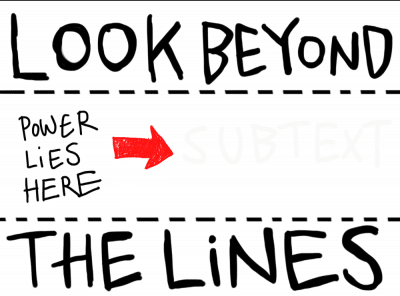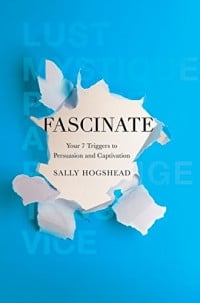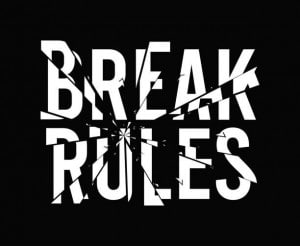
I don’t even have to tell you what slap I’m talking about, do I?
Even if you didn’t see it on TV (either from the Oscars or News / Talk Show Coverage), you likely saw it online.
And if you didn’t see it online, you still heard about it.
In fact, you probably haven’t stopped hearing about it.
That’s powerful.
Imagine if you could harness that power for your ads…
Well, you can — IF you learn and apply these three principles:
Principle 1: People Aren’t Really Talking About The Slap
 Face it, Will Smith (and Chris Rock) are largely irrelevant to our lives.
Face it, Will Smith (and Chris Rock) are largely irrelevant to our lives.
Granted, they are part of pop culture, and popular culture does affect us.
But in the bigger picture, no one ought to care that much about a minor scuffle between celebrities.
It ain’t going to affect the price of food or gas or rent, or your general happiness, is it?
So why are people talking about it nonstop?
Answer: they aren’t.
They’re really talking about themselves.
The ostensible topic (i.e., the slap) is nothing more than a pretext or vehicle for talking about everyone’s favorite topic: themselves.
Whenever someone talks about the slap — regardless of whether it’s to condemn or justify Will or Chris — what they’re really communicating is their worldview and values.
They’re communicating what they think is right and just.
What ought to have been done about the slap.
Or what they themselves might have done had they been in either party’s shoes that night.
And this isn’t just true about the slap; it’s true about everything.
My favorite example of this phenomenon is the following scene from the movie Sideways:
[Note: if you haven’t seen the film, don’t worry, there are no spoilers, and you’ll understand the point absent any larger context]
Now, do you really think either one of those characters was actually talking about wine?
Or were they rather blatantly talking about themselves?
Harnessing The “Really Talking About Me” Principle
The short answer to harnessing this power for your ads is to speak on behalf of your own business in your ads.
Become the owner-spokesperson.
But don’t blatantly talk about yourself.
At least not most of the time.
Sure, you can and should tell your Genesis Story.
But most of the time, you’ll want to use other topics as a way to covertly communicate your worldview and values.
A perfect example of that is this short radio ad for James Sylvestre Enterprises (JSE).
Superficially, the ad is about nails.
But really, it’s about the values that direct and guide how JSE does business.
It’s about Jeff. How could it not be?
Principle 2: Gossip Triggers (AKA, Fascination Triggers)
 In her book, Fascinate, Sally Hogshead provides seven triggers that create fascination:
In her book, Fascinate, Sally Hogshead provides seven triggers that create fascination:
- Lust
- Mystique
- Alarm
- Prestige
- Power
- Vice
- Trust
Now think of how many triggers are embodied by “The Slap.”
You have the Prestige associated with The Oscars as well as that commanded by the two celebrities.
Plus, you can also think of Prestige as status and the associated loss or gain of status that resulted from The Slap.
You have Alarm triggered by an act of violence.
You also have the Vice (aka, Taboo) of Will Smith climbing on stage and committing a felony assault on live TV.
Finally, you have issues of Power — was Will’s actions an attempted dominance display? Did it work? And what is Power if not the ability to commit a crime and then receive not a punishment, but a reward?
So while Sally Hogshead calls these Fascination Triggers, I think of them as gossip triggers.
They get people talking about other people.
Harnessing The Gossip Triggers
First, your ad has to have characters to trigger gossip.
And, no, announcers don’t count.
Even owner as spokesperson doesn’t count UNLESS you present yourself as a 3-dimensional character with a recognizable voice, viewpoint, etc.
But second, you have to bake fascination principles into your ads.
If you don’t talk about anything that touches on those seven triggers, you won’t give your audience anything to talk about.
And since I used JSE and Jeff Sylvestre in the previous example, I’ll continue using those ads for this example as well.
Take a listen and see how many Gossip Triggers you can find:
At a minimum, I’d say that ad uses Alarm, Prestige, and Trust to powerful effect.
And, yes, people in Windsor, Canada talked about that ad quite a bit.
Principle 3: Break the Rules and Pick a Fight
 Conflict drives stories and holds the audience’s interest.
Conflict drives stories and holds the audience’s interest.
Without conflict not only is there no story, there’s no willing audience.
This is why there are no movies made about good things happening to good people who all get along with each other.
And the most physical and immediate manifestation of conflict is physical violence.
But it doesn’t take a physical fight to engage interest.
Imagine if Will Smith had foregone the slap and simply got on stage and yelled at Chris Rock?
It still would have been scandalous and much talked about.
Christ would have still broken the rules around award shows by getting up on stage.
Just look at how people gossiped over Kanye West’s stage crashing the Grammies.
And in this example, Smith still would have picked a (non-physical) fight with Chris Rock.
Harnessing Rule-Breaking and Fight-Picking
First of all, don’t let your ads sound like ads.
If everyone else is using background music, consider running your ads dry. And vice versa
Break the (largely unwritten) rules governing advertising.
Say things you’re “not supposed to say” in ads.
Say them in ways that wouldn’t occur to others. Or perhaps in ways that others might think rude.
As my mentor says, “The risk of insult is the price of clarity.”
And OPEN BIG!
In that second JSE ad, Jeff Sylvestre not only opens big, he says something most business owners wouldn’t say in an ad, let alone lead with.
He also admits something most business owners wouldn’t want to admit in an ad.
He even swears.
In other words, he breaks a lot of rules.
And then there’s picking a fight.
In advertising terms, that means telling the audience what you stand against.
Bonus points if what you stand against is a widespread practice in your industry.
From the ads you’ve heard, you can tell that Jeff Sylvestre stands against:
- Cheap Big Charlies
- Dishonest, non-guaranteed bids
- Shoddy workmanship
- 2nd-rate materials
Putting It All Together
If you noticed that there’s some overlap between these principles, congratulations: you’re a quick study.
There is indeed overlap, and that’s a good thing.
Picking a fight necessarily involves the Gossip Triggers of Power and Prestige and possibly Alarm.
And if you’re picking a fight against dishonest practices or corner cutting, you can add Vice to that list with regards to your competitors as well as Trust in you.
Better yet, if you’re the spokesperson for your ads, and you employ the “Really Talking About Me” principle, you’ll not only bond with your audience, you’ll further build Trust.
So if you’re tired of hearing about The Slap everywhere you go, online or off, don’t fret, just hire yourself an ad consultant who can make your ads almost as ubiquitously talked about.
Then you can laugh at pop-culture shenanigans all the way to the bank.
- Getting a Foot in the Door — Of Perception - November 27, 2025
- What Digital Superstars Know About Offline Advertising - November 17, 2025
- Unmistakable: A Tale of Two Boots and Branding Done Right - November 8, 2025
